There are several types of speakers that will work with vinyl turntables and record players.
- Bluetooth Speakers
- Powered Speakers
- Passive Speakers
- Soundbars
- Smart Speakers
- Studio Monitors
- PC Speakers
- Headphones
Which are best for vinyl?
Well, best is subjective term and dependent on usage, budget and so on.
I use passive speakers in my most expensive system and powered speakers in my affordable system. These two speaker types will generally be the best options. But there are other speaker types that might be a better fit in your situation.
Let’s look at the pros and cons of each speaker type to help you decide which type that is best for you.
1. Bluetooth Speakers
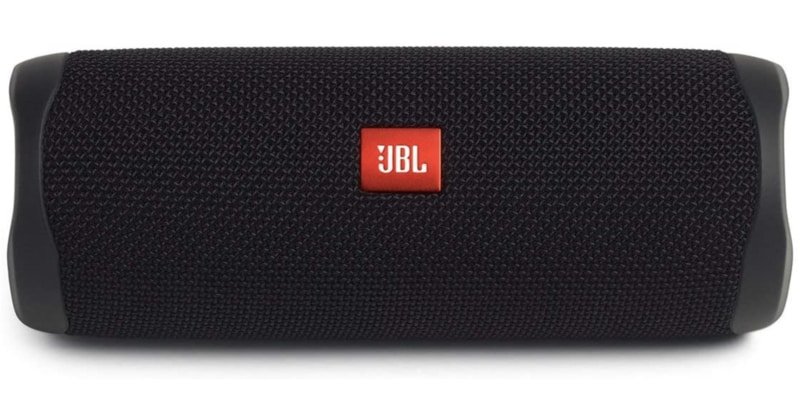
Bluetooth speakers connect wirelessly to your music source using the Bluetooth protocol. They are often portable and can sometimes operate on batteries.
Bluetooth speakers are compact, portable, and practical. They may, however, not sound as good as other types of speakers that are designed with a stronger focus on sound quality over practicality.
There are several ways to connect a Bluetooth speaker to a turntable or record player.
- Connect wirelessly to a Bluetooth capable turntable
- Connect wirelessly to a regular turntable with a Bluetooth transmitter
- Wired connection using a signal cable if the Bluetooth speaker features a stereo AUX input
The best option may be to use a Bluetooth turntable that connects wirelessly to the Bluetooth speaker. That eliminate the need for a signal cable. You can find a list of good Bluetooth turntables in my Best Bluetooth Turntables guide.
Pros
- Affordable
- Versatile
- Portable
- Often operates on batteries
Cons
- May lack AUX input for cabled turntable connection
- Compact size and portability may sacrifice sound quality
- Suitable for entry-level and midrange systems, but not for audiophile and high-end applications
My thoughts
A Bluetooth speaker is a good option if you want a compact and versatile speaker that you sometimes also want to use with a turntable. Most suited for Bluetooth turntable with built-in wireless capability. If you are a passionate vinyl listener and want great sounding speakers to hook up to a home stereo, I think passive or powered speakers are better options.
2. Powered Speakers
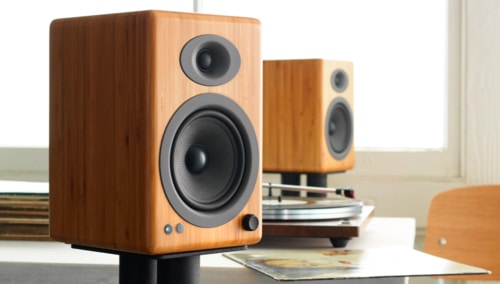
Powered speaker systems consisted of two separate speakers that can be placed a few feet apart to form a traditional stereo setup. They come with the amplifier built into the cabinet(s) and don’t need a standalone amplifier or receiver.
Powered speakers connect directly to your turntable (or phono preamp) with a signal cable. They can also be connected wirelessly if both the speakers and turntable have Bluetooth connectivity.
Powered speakers range from very affordable to very expensive. Most options are, however, found in the affordable and midrange price categories.
Pros
- Models available for every budget (entry-level, midrange, audiophile, and high-end)
- Includes two speakers that can be spread out in a 2-channel stereo configuration
- Do not require a standalone amplifier or receiver
- Many models feature wireless Bluetooth
- Many models feature subwoofer output to connect a separate sub
Cons
- Not as portable and versatile Bluetooth speakers
- Options become fewer in the audiophile and high-end spectrum
- Sound character can’t be tweaked by swapping amplifiers as with passive speakers
My thoughts
I think powered speakers are a brilliant choice for vinyl if you want a compact system that is easy to set up and use. Powered speakers can be configured as a stereo setup just like passive speakers, but don’t need a standalone amplifier or receiver. That saves money, space, and cables.
For audiophile and high-end applications, there are, however, a lot more options to choose from if you go for a traditional standalone amplifier and passive speaker system.
Check out our 10 Best Powered Speakers for Turntables article to see our top recommendation.
You can also find our recommended systems in our 10 Great Turntable and Speaker Combos guide.
3. Passive Speakers
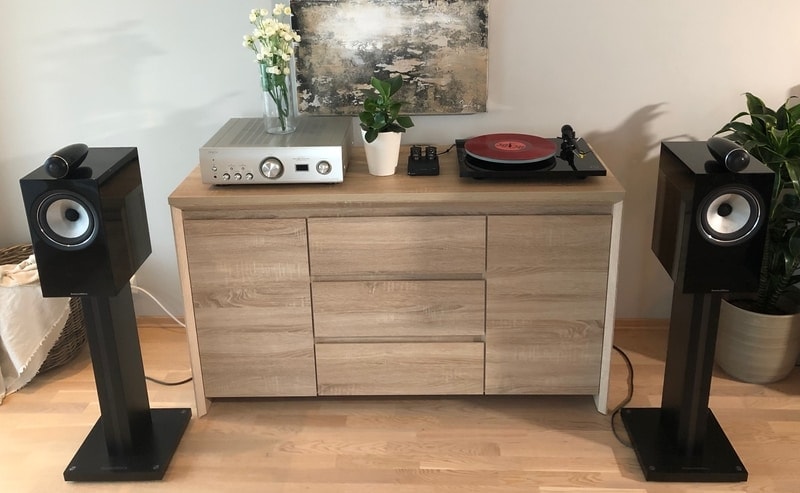
Passive speakers need to be driven by an external amplifier or receiver. They don’t connect directly to turntables and record players, but need an amplifier in between. Passive speakers are probably the most common type of speaker, at least for traditional stereo systems.
I currently do most of my vinyl listening with a set of Klipsch Heresy IV passive speakers that I drive with a vintage vacuum tube stereo amplifier. My turntable connects to the amp.
Passive speakers are probably the most flexible type because there are a trillion speaker and amplifier combinations to choose from. This might be overwhelming for some, while others enjoy all the options it gives to find the perfect amplifier and speaker combinations.
Floorstanding passive speakers will generally have deeper and more powerful bass than bookshelf passive speakers that are smaller but generally need less space to sound good. A general guideline is to choose floorstanding speakers for bigger rooms. Big speakers in a small room can however make the bass boomy and muddy.
Pros
- Thousands of options to choose from (literary)
- Wide range of prices, sizes, designs and sounds
- Big used marked to search for bargains
- Possible to tweak sound by swapping the amplifier
Cons
- Need a separate amplifier or receiver
- Not as compact as other speaker types. More boxes and cables
- Not the best option for the lowest budgets
My thoughts
Passive speakers give a lot of flexibility and often the best sound quality. Audiophiles stick to this type of speaker for that reason. This is probably the best option if you want wonderful sound and have the extra space needed for the amplifier or receiver. For a more compact system that arguably gives more value for money, a powered speakers system is a great alternative.
4. Soundbars
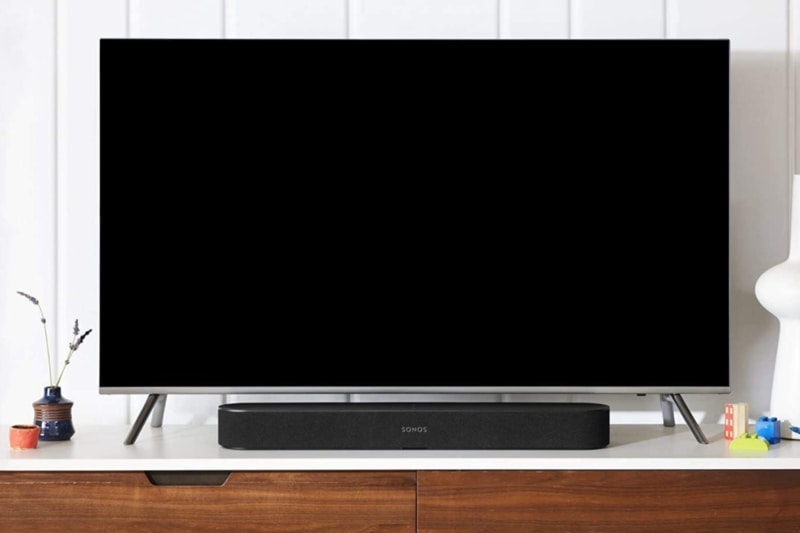
Soundbars are designed for TV and movies but can also work as a speaker for your turntable or record player.
It is, however, important to select the soundbar carefully, because many of them don’t come with an AUX input or Bluetooth, which makes it difficult to connect them to a turntable.
I have a separate article that explains how you connect a turntable to a soundbar and another article that lists some of the best soundbars with the connectivity needed for turntables.
Pros
- Great if your main usages combine TV, movies and vinyl spinning
- Compact
- No separate amplifier needed
- Often come in set with a subwoofer for deeper bass
Cons
- Will not sound as well as a traditional two-speaker stereo setup for critical music listening
- Many soundbars don’t feature the connectivity for turntables. So, choose carefully.
My thoughts
I would not buy a soundbar if your plan is to primarily use it as a speaker for vinyl listening. I think powered speakers are a better choice in that situation. A soundbar may, however, be perfect If you are looking for a speaker to use with both a TV and turntable. Just make sure to buy a soundbar that connects to turntables. One with AUX input or Bluetooth.
5. Smart Speakers
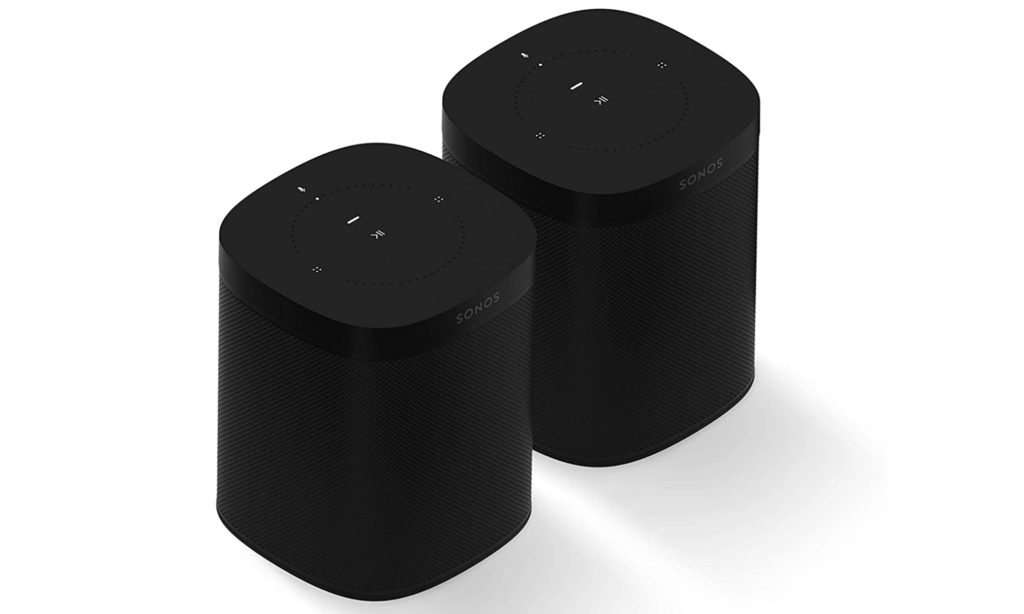
Smart speakers like Google Home, Amazon Alexa, Sonos and so on usually comes with options to connect a turntable, either using a 3.5mm AUX analog input or Bluetooth.
A turntable with Bluetooth functionality is probably your best bet if you plan to use it with smart speakers and music systems.
If you consider a smart home speaker system that plays music to speakers in multiple rooms in your house, then you will probably need to hook the turntable up to a connectivity hub that distributes the signal wirelessly to al the speakers. To use Sonos as an example, the Sonos Port will be the necessary device for this task.
Pros
- Versatile and elegant
- Stream music to multiple rooms
- Expandable
- Lots of extra features
Cons
- Not the best option if sound quality is important to you
- Not all smart speakers connect to analog sources (Bluetooth turntable needed)
My thoughts
Choosing smart speakers for your turntable is a sexy and versatile option. You probably want a Bluetooth turntable to take advantage of the elegance of a cable free connection. Some smart speaker systems will require a Bluetooth turntable to connect, as there are no analog inputs.
If your priority is to get as much sound quality as possible for the money spent, you are probably better off with decent powered speakers or passive speakers.
You can find good turntables to use with smart speakers in my Best Turntables for Sonos guide.
6. Studio Monitors
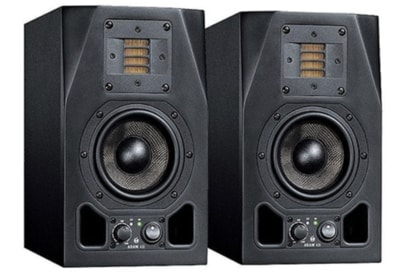
Studio monitors can work with turntables, but for multiple reasons, they are probably not the best option for vinyl music listening.
Studio monitors are designed for professional usage and often come with only XLR balanced inputs, which is the standard for professional music gear. Lacking both RCA inputs and Bluetooth connectivity is not uncommented for studio monitors, which will require special adapters to connect to turntables.
Studio monitors are furthermore designed to analyze music in the near field, meaning that they are designed to be placed very close to the listener and often have an analytical sound character. They are usually not designed to fill a room with warm and smooth sounding music, even tho they will do a decent job at that.
Studio monitors are robust and durable professional tools and may not have the pleasant look and feel of many powered and passive speakers designed for home audio.
Pros
- Built-in amplifier
- Clear sound (analytical)
- Robust
Cons
- Usually not as nicely designed as power speakers for home audio
- Standard connectivity is balanced XLR for professional use
- Designed for near-field music listening
My thoughts
Studio monitors should probably not be your first choice if you are looking for speakers to use for vinyl spinning in your home. They are not primarily designed for that. Powered speakers designed for home usage are likely a better option in most cases. If studio monitors are what you want, and you are aware of the potential connectivity issues, they can do a decent job as vinyl speakers.
7. PC Speakers
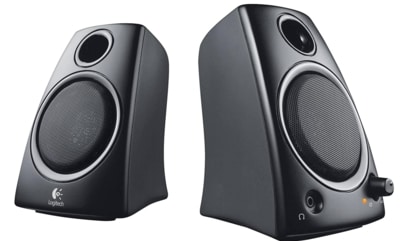
PC speakers are compact powered speakers designed to enhance the sound of computers without taking up too much real estate on the desk. They usually (not always) have 3.5mm analog input that make the compatible for wired connection to turntables. They often have Bluetooth connectivity as well.
Some PC speakers do, however, come with only USB connectivity, which is not compatible with turntables without a special USB to RCA adaptor.
PC speakers have many commonalities with powered speaker systems and will work fine with turntables in most cases. Just be aware that cheap PC speakers are too small and cheaply made to deliver clear sound and deep bass.
Pros
- Small
- Affordable
Cons
- Lack detailed sound (affordable options)
- Lack deep bass
My thoughts
The benefits of PC speakers are that they are often compact and affordable. Which is great if you are looking for highly affordable speakers for a turntable. The downside is the poor overall sound quality. They are not designed to fill a room with open and clear music or deliver snappy deep bass. Decent powered speakers will give a more engaging music listening experience than PC speakers in most cases.
8. Headphones
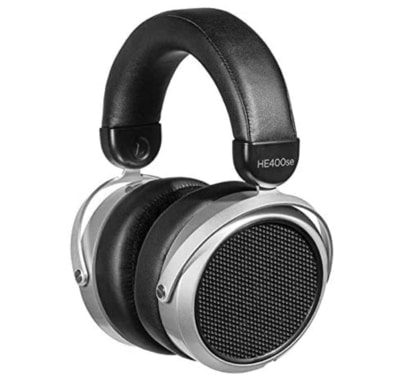
Headphones are not speakers per se, but they have a few advantages over speakers that make them worth a mention.
If you put a few hundred bucks into headphones, the same amount of money as many midrange speakers cost, you can get amazingly clear and detailed sound with fast, snappy bass.
Because of the smaller size and simple design, it costs far less to make audiophile headphones than audiophile speakers. You will also eliminate all the acoustical issues caused by the room.
For the very best sound, cabled, open, over the ear headphones are probably the best option. With these, no manufacturing cost is spent on Bluetooth connectivity or noise cancellation. Fewer and simpler parts give higher sound quality for the same total cost.
With cabled headphones, you will need a headphone amplifier. There are a few turntable models that feature a headphone output, but most turntables can’t be connected directly to wired headphones. Bluetooth turntables do, however, connect beautifully with Bluetooth headphones.
Check out this guide for recommended headphone amps for vinyl.
Pros
- Audiophile sound for far less money
- You can play loud without disturbing others
- Sound just as good in rooms with nasty acoustics
Cons
- Only suitable for solo listening
- Can be uncomfortable for longer listening session
My thoughts
For solo music listening, headphones can give a much more detailed sound than all the speaker options for the same money. But headphones can obviously not replace speakers for most usages.
Conclusion
If traditional music listening is the main usage for your speakers.
And good sound quality is an important factor for you.
Then traditional passive speakers or decent powered speakers are the two best options, in my opinion.
These types of speakers aren’t designed to do everything but rather designed with a focus on delivering good sound and an engaging music listening experience in 2-channel stereo.
If you are looking for speakers for multiple usages, for example:
- Movie watching and vinyl spinning, or
- Digital streaming to multiple rooms and vinyl spinning
Then there is nothing wrong with selecting a type of speakers that is primarily designed for other usages than connecting a turntable.
You might sacrifice a bit of sound quality this way, but that is a minor concern for many of us.
Just make sure that you select a speaker and turntable that actually connect.
FAQ
Do I need phono preamp to play vinyl?
A turntable needs a phono preamp (phonostage) to sound right.
The preamp can be included in the turntable, be a separate box or built-into the amplifier/receiver or powered speakers.
Most entry-level turntables and all Bluetooth turntables have a preamp built in.
Expensive turntables rarely come with a preamp built in.
Amplifiers, receivers, and powered speakers sometimes come with a preamp built in and sometimes not. It has, however, become more popular to include a preamp in these products over the recent years because of the increased popularity of vinyl records.
Do you need special speakers for vinyl?
You don’t need special speakers for vinyl. There are, however, many ways to connect speakers to a turntable, depending on the type of speakers and turntable.
Can you use any speakers for vinyl?
Not every type of speaker connects to every type of turntable.
You can, for example, not connect a soundbar with only a HDMI input to a turntable. At least not without becoming very creative.
The same is true for Bluetooth speakers. They won’t connect to a standard (non-Bluetooth) turntable. At least not without a separate Bluetooth adaptor.
Connecting a turntable without preamp to powered speakers without preamp will also not work.
There are, however, options to connect most turntables to most speakers, but it might require purchasing extra equipment in some cases. Cables, preamps, adapters, etc.
Are powered/active speakers good for vinyl?
Powered or active speakers are a very good solution for vinyl in many cases. They arguably offer the most cost-effective solution.
For audiophile and high-end applications, powered and active speakers are few and far between. But there are lots of options to choose from in the affordable and midrange price categories.
Does vinyl sound better?
The benefit of vinyl is that it has never been digitized or compressed.
With a good turntable and cartridge, vinyl will usually sound better than highly compressed digital formats like mp3 etc.
With today’s lossless digital formats and a good DAC, you will probably need very expensive system and good ears to hear a difference.
What is the difference between active and powered speakers?
Powered speakers usually have one amplifier that is placed in one of the speaker cabinets. That single amplifier drive both speakers. Powered speakers also use passive crossovers.
Active speakers usually have two amplifiers in each speaker cabinet. One amp that drives the tweeter and one amp that drives the woofer. A total of 4 amplifiers for a pair of 2-way speakers. Active speakers also utilize active crossovers.
Active speakers are more expensive to make than powered speakers and are mostly found in the high-end market place.
You can read more about the difference in my Passive vs Powered vs Active Speakers Guide.
What are passive speakers?
Passive speakers are speakers without an amplifier built into the cabinet. Passive speakers need a separate amplifier or receiver.
How do you hook up speakers to a vinyl player?
There are mainly three ways to hook up speakers to a turntable.
- Connect powered speakers directly to the turntable
- Connect the turntable to an amplifier that drives passive speakers
- Connect a Bluetooth turntable wirelessly to Bluetooth speakers
Do you need amplifier for speakers?
Passive speakers need an amplifier, whereas powered speakers, Bluetooth speakers, and smart speakers don’t.